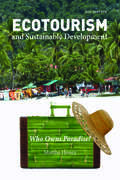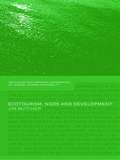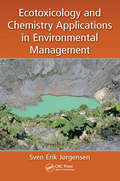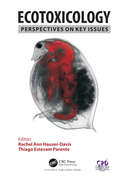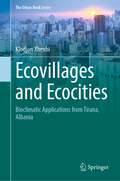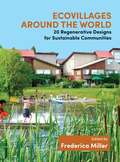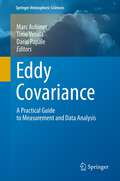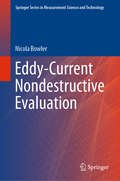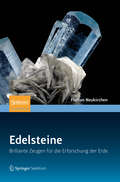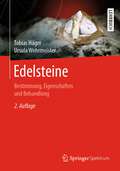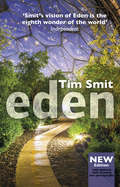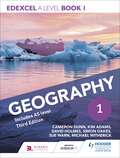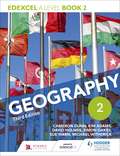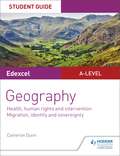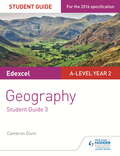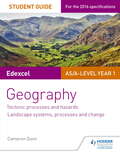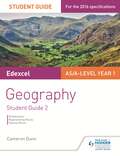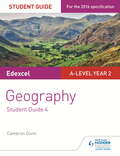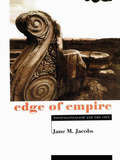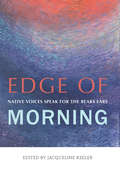- Table View
- List View
Ecotourism and Sustainable Development, Second Edition: Who Owns Paradise?
by Martha HoneyEcotourism and Sustainable Development is the most comprehensive overview of worldwide ecotourism available today, showing how both the concept and the reality have evolved over more than twenty-five years. Here Martha Honey revisits six nations she profiled in the first edition--the Galapagos Islands, Costa Rica, Tanzania, Zanzibar, Kenya, and South Africa--and adds a fascinating new chapter on the United States. She examines the growth of ecotourism within each country's tourism strategy, its political system, and its changing economic policies. Her useful case studies highlight the economic and cultural impacts of expanding tourism on indigenous populations as well as on ecosystems.
Ecotourism, NGOs and Development: A Critical Analysis (Contemporary Geographies of Leisure, Tourism and Mobility #Vol. 8)
by Jim ButcherEcotourism has emerged over the last twenty years not just as a market niche, but also as a strategy for combining development with conservation in the developing world. Ecotourism, NGOs and Development considers the basis for advocacy and argues that it is premised upon a very limited and limiting view of the potential for development. Jim Butcher examines the advocacy of tourism as sustainable development in a range of NGOs and within the general literature. The research reveals that in spite of the plethora of critical commentaries on the operation of ecotourism projects, there is generally an uncritical take on the ideological basis of the projects. This book offers a timely critique of key assumptions underlying ecotourism's status as sustainable development, arguing that ecotourism as development strategy ties the fate of some of the poorest people on the planet to localized environmental imperatives.
Ecotoxicology and Chemistry Applications in Environmental Management (Applied Ecology and Environmental Management)
by Sven Erik JorgensenEcotoxicology and Chemistry Applications in Environmental Management describes how to set up an integrated, holistic approach to addressing ecotoxicological problems. It provides detailed explanations in answer to questions like "Why is it necessary to apply an integrated approach?" and "How does one apply an integrated environmental management approach?" Highlighted topics of the book include Environmental chemical calculations QSAR estimation methods Toxic substance interference with other environmental problems Using diagnostic ecological subdisciplines for solutions Cleaner production methods and technologies Environmental risk assessment Addressing one of the most difficult tasks today, this book provides a much-needed holistic view for translating scientific knowledge and research results into effective environmental management measures. Rooted in a seven-step method, it integrates examination and quantification of an environmental problem and describes the use of ecological diagnostic tools to develop a diagnosis for ecosystem health. It also presents methods for choosing and using solutions or combinations of solutions to tackle problems.
Ecotoxicology: Perspectives on Key Issues
by Rachel Ann Hauser-Davis Thiago Estevam ParenteThis book presents an integrated discussion on ecotoxicology, containing both general concepts and specific ecotoxicological issues of major biological groups, extending beyond conventional systems. It explores worldwide, regional, and biocompartmentalized topics, bringing forth new points of view on global issues and addressing the increasing diversity and complexity of the ecotoxicological field. It also contains novel information on emerging contaminants, presents bioaccumulation effects on different levels of ecological organization and risk analyses, and discusses novel fields of methodological applications, including key aspects in ecotoxicological and environmental monitoring studies.
Ecovillages and Ecocities: Bioclimatic Applications from Tirana, Albania (The Urban Book Series)
by Klodjan XhexhiEcological and livable cities need an objective method to be examined. This book is in search of a method to determine the level of livability, ecology and energy efficiency. Ecological and sustainable cities need to properly make up for the existent weakness of the city's construction under fine ecological environment. The intention of this comparative study is an attempt to improve life quality in Tirana, Albania. It gives examples of successful strategies, e.g. bioclimatic solution through passive solar systems and the use of underground tunnels. This book is aimed at researches, professionals, architects and city planners.
Ecovillages around the World: 20 Regenerative Designs for Sustainable Communities
by Frederica Miller<p>Aligning perfectly with the practices of ecovillages around the world, these initiatives show that ecovillages and sustainable communities are leading by example as we move into a future focused on partnership, environmental protection, prosperity, and peace for all life and the planet we live on. <p>Offering a visual tribute to the work ecovillages do to alleviate climate change, social conflict, and environmental damage, including more than 300 full-color photographs, maps, and diagrams, this beautiful book highlights 20 best practice designs from ecovillages around the world to show how we can live lightly on the planet no matter where on earth we live, in all climate zones and cultures. It demonstrates how ecovillages have already achieved the climate goals all of us are now striving toward through practical lifestyle changes that promote peaceful and joyful coexistence both among people and between people and nature. Far from being only aesthetic choices, these changes give an increased quality of life, healthy homes, delicious organic food, playful interdependence, a new spiritual connection to our living planet, and much more. Through their regenerative, sustainable, and peace-promoting practices, ecovillages continue the culture of traditional village living in a modern way that addresses the critical challenges of our time. <p>The book features the following 20 ecovillage projects: Hurdal Ecovillage and Hurdal Sustainable Valley, Norway; Svanholm, Denmark; Permatopia, Denmark; Solheimar, Iceland; Lilleoru, Tallin, Estonia; Findhorn, Scotland; Sieben Linden, Germany; Tamera, Portugal; Damanhur, Italy; Torri Superiore, Italy; Kibbutz Lotan, Israel; Sekem, Egypt; Chololo, Tanzania; Tasman Ecovillage, Australia; Narara, Australia; Hua Tao Ecovillage, China; Auroville, India; Ecovillage at Ithaca, New York, USA; Huehuecoyotl, Mexico; Ceo do Mapia, Brazil.
Eddy Covariance
by Dario Papale Timo Vesala Marc AubinetThis highly practical handbook is an exhaustive treatment of eddy covariance measurement that will be of keen interest to scientists who are not necessarily specialists in micrometeorology. The chapters cover measuring fluxes using eddy covariance technique, from the tower installation and system dimensioning to data collection, correction and analysis. With a state-of-the-art perspective, the authors examine the latest techniques and address the most up-to-date methods for data processing and quality control. The chapters provide answers to data treatment problems including data filtering, footprint analysis, data gap filling, uncertainty evaluation, and flux separation, among others. The authors cover the application of measurement techniques in different ecosystems such as forest, crops, grassland, wetland, lakes and rivers, and urban areas, highlighting peculiarities, specific practices and methods to be considered. The book also covers what to do when you have all your data, summarizing the objectives of a database as well as using case studies of the CarboEurope and FLUXNET databases to demonstrate the way they should be maintained and managed. Policies for data use, exchange and publication are also discussed and proposed. This one compendium is a valuable source of information on eddy covariance measurement that allows readers to make rational and relevant choices in positioning, dimensioning, installing and maintaining an eddy covariance site; collecting, treating, correcting and analyzing eddy covariance data; and scaling up eddy flux measurements to annual scale and evaluating their uncertainty.
Eddy-Current Nondestructive Evaluation (Springer Series in Measurement Science and Technology)
by Nicola BowlerThis book covers the topic of eddy current nondestructive evaluation, the most commonly practiced method of electromagnetic nondestructive evaluation (NDE). It emphasizes a clear presentation of the concepts, laws and relationships of electricity and magnetism upon which eddy current inspection methods are founded. The chapters include material on signals obtained using many common eddy current probe types in various testing environments. Introductory mathematical and physical concepts in electromagnetism are introduced in sufficient detail and summarized in the Appendices for easy reference. Worked examples and simple calculations that can be done by hand are distributed throughout the text. These and more complex end-of-chapter examples and assignments are designed to impart a working knowledge of the connection between electromagnetic theory and the practical measurements described. The book is intended to equip readers with sufficient knowledge to optimize routine eddy current NDE inspections, or design new ones. It is useful for graduate engineers and scientists seeking a deeper understanding of electromagnetic methods of NDE than can be found in a guide for practitioners.
Edelsteine
by Florian NeukirchenWie entstehen Edelsteine? Wo gibt es sie? Und was können wir von ihnen lernen? Bei der Bildung von Smaragd, Rubin, Diamant, Topas oder Opal sind die beteiligten Zutaten und Prozesse so vielfältig wie die Edelsteine selbst. Während beispielsweise die Riesenkristalle eines Pegmatits innerhalb von Tagen wachsen, dauert die Entstehung von Amethystgeoden einige Millionen Jahre. Anschaulich erklärt Florian Neukirchen, wie seltene Elemente angereichert werden und wie es zu ungewöhnlichen Begegnungen zwischen Spurenelementen kommt. Diamanten verdanken wir nicht nur einiges Wissen über den Erdmantel, sondern auch über die Entstehung der ersten Kontinente. Bei ihrer Bildung spielen Redoxreaktionen im Erdmantel eine ähnlich wichtige Rolle wie ungewöhnlich ablaufende Vulkaneruptionen, durch die sie sicher an die Oberfläche gebracht werden, ohne zu verbrennen. Edelsteine erzählen uns manch erstaunliche Geschichte: Wie eine Kapsel, die geheime Dokumente birgt, enthalten sie Informationen über unzugängliche Regionen der Erde aus einer fernen Vergangenheit und sogar aus der Tiefe des Weltalls: In Meteoriten wurden Diamanten gefunden, die sogar älter als das Sonnensystem sind. Granate dienen Forschern als eine Art Thermometer, da sie die Bildungstemperatur eines Gesteins anzeigen. Einige Zirkonkristalle sind die einzigen Zeugen aus der höllisch heißen Frühzeit der Erde, aus der keine Gesteine erhalten sind. Die winzigen Kristalle ermöglichen uns sogar Aussagen über das damalige Klima. Abgerundet wird das Buch mit Informationen über Minen, Märkte und antike Handelsrouten und einem Kapitel über die technische Anwendung und synthetische Herstellung von Edelsteinen.
Edelsteine: Bestimmung, Eigenschaften und Behandlung
by Tobias Häger Ursula WehrmeisterDas Buch gibt einen anschaulichen Überblick über das facettenreiche Gebiet der Gemmologie in Theorie und Praxis. Im ersten Teil werden die klassischen und modernen Methoden zur Bestimmung und Erkennung der Edelsteine ausführlich vorgestellt. Der zweite Teil des Buches umfasst den komplexen Bereich der Manipulationen und Behandlung der Schmuckmaterialien sowie ihre Erkennungsmöglichkeiten. Die Kapitel des letzten Teils widmen sich den Grundlagen zum besseren Verständnis der Eigenschaften und Methoden.
Eden: Updated 15th Anniversary Edition
by Tim Smit'Smit's vision of Eden is the eighth wonder of the world' Independent'Inspiring... An invaluable guide to how a large project can exceed against all odds' The Sunday Times-An updated edition of the bestselling story of the Eden Project featuring stunning new photography.At the beginning of the twenty-first century, the impossible was delivered. From the sterile depths of a disused china clay pit in Cornwall rose one of the most remarkable and ambitious ventures in recent memory. The Eden Project's Biomes, the world's largest conservatories, are the symbol of a living theatre of plants and people and their interdependence, of regeneration and of a pioneering forum for the exploration of possible futures.This is the extraordinary story of the Eden Project, of its conception, design and construction, of the larger-than-life personalities who made it happen and of all that has happened since its doors were first opened to the public in 2001. It is now undisputedly one of the world's great gardens with more than 17 million visitors flocking there and projects and partnerships all over the world.
Edexcel A level Geography Book 1
by Cameron Dunn David Holmes Kim AdamsEndorsed for EdexcelTrust the leading A level Geography publisher to boost your students' geographical knowledge and skills with a fully updated edition of our bestselling Student's Book; designed to provide the in-depth subject coverage, developmental activities and exam support you need at a time of curriculum change.- Helps students acquire, apply and revise core knowledge using clear explanations of key geographical content and concepts- Progressively builds the geographical and data skills emphasised in the 2016 specification by offering plenty of opportunities to learn and practise relevant skills for each topic- Brings geographical theory to life with a bank of engaging, up-to-date case studies, examples and place contexts- Consolidates topic knowledge and enables students to track their learning with review questions at the end of each chapter- Prepares students for the demands of AS and A level examinations by including numerous exam-style questions, ideal for skills development and rolling revision throughout the course- Makes it easier for you to meet the increased fieldwork requirements, suggesting topic-focused enquiries for both physical and human geography
Edexcel A level Geography Book 1 Third Edition
by Sue Warn Cameron Dunn Simon Oakes David Holmes Michael Witherick Kim AdamsExam Board: EdexcelLevel: AS/A-levelSubject: GeographyFirst Teaching: September 2016First Exam: June 2017Endorsed for Edexcel.Trust the leading A level Geography publisher to boost your students' geographical knowledge and skills with a fully updated edition of our bestselling Student's Book; designed to provide the in-depth subject coverage, developmental activities and exam support you need at a time of curriculum change.- Helps students acquire, apply and revise core knowledge using clear explanations of key geographical content and concepts- Progressively builds the geographical and data skills emphasised in the 2016 specification by offering plenty of opportunities to learn and practise relevant skills for each topic- Brings geographical theory to life with a bank of engaging, up-to-date case studies, examples and place contexts- Consolidates topic knowledge and enables students to track their learning with review questions at the end of each chapter- Prepares students for the demands of AS and A level examinations by including numerous exam-style questions, ideal for skills development and rolling revision throughout the course- Makes it easier for you to meet the increased fieldwork requirements, suggesting topic-focused enquiries for both physical and human geography
Edexcel A level Geography Book 2 Third Edition
by Cameron Dunn David Holmes Kim AdamsEndorsed for EdexcelTrust the leading A level Geography publisher to boost your students' geographical knowledge and skills with a fully updated edition of our bestselling Student's Book; designed to provide the in-depth subject coverage, developmental activities and exam support you need at a time of curriculum change.- Helps students acquire, apply and revise core knowledge using clear explanations of key geographical content and concepts- Progressively builds the geographical and data skills emphasised in the 2016 specification by offering plenty of opportunities to learn and practise relevant skills for each topic- Brings geographical theory to life with a bank of engaging, up-to-date case studies, examples and place contexts- Consolidates topic knowledge and enables students to track their learning with review questions at the end of each chapter- Prepares students for the demands of AS and A level examinations by including numerous exam-style questions, ideal for skills development and rolling revision throughout the course- Makes it easier for you to meet the increased fieldwork requirements, suggesting topic-focused enquiries for both physical and human geography
Edexcel A-level Geography Student Guide 5: Health Human Rights Epub
by Cameron DunnExam Board: EdexcelLevel: AS/A-levelSubject: GeographyFirst teaching: September 2016First exams: Summer 2017 (AS), Summer 2018 (A-level)Reinforce students' geographical understanding throughout their course; clear topic summaries with sample questions and answers help students improve their exam technique and achieve their best.Written by a teacher with extensive examining experience, this guide:- Helps students identify what they need to know with a concise summary of the topics examined at AS and A-level- Consolidates understanding through assessment tips and knowledge-check questions- Offers opportunities for students to improve their exam technique by consulting sample graded answers to exam-style questions- Develops independent learning and research skills- Provides the content students need to produce their own revision notes
Edexcel A-level Year 2 Geography Student Guide 3: The Water Cycle and Water Insecurity; The Carbon Cycle and Energy Security; Superpowers
by Cameron Dunn Michael WitherickReinforce students' geographical understanding throughout their course; clear topic summaries with sample questions and answers help students improve their exam technique and achieve their best.Written by a teacher with extensive examining experience, this guide:- Helps students identify what they need to know with a concise summary of the topics examined at AS and A-level- Consolidates understanding through assessment tips and knowledge-check questions- Offers opportunities for students to improve their exam technique by consulting sample graded answers to exam-style questions- Develops independent learning and research skills- Provides the content students need to produce their own revision notes
Edexcel A-level Year 2 Geography Student Guide 3: The Water Cycle and Water Insecurity; The Carbon Cycle and Energy Security; Superpowers
by Cameron Dunn Michael WitherickExam board: EdexcelLevel: A-levelSubject: GeographyFirst teaching: September 2016First exams: Summer 2017Reinforce students' geographical understanding throughout their course; clear topic summaries with sample questions and answers help students improve their exam technique and achieve their best.Written by a teacher with extensive examining experience, this guide:- Helps students identify what they need to know with a concise summary of the topics examined at AS and A-level- Consolidates understanding through assessment tips and knowledge-check questions- Offers opportunities for students to improve their exam technique by consulting sample graded answers to exam-style questions- Develops independent learning and research skills- Provides the content students need to produce their own revision notes
Edexcel AS/A-level Geography Student Guide 1: Tectonic Processes and Hazards; Landscape systems, processes and change
by Cameron DunnReinforce students' geographical understanding throughout their course; clear topic summaries with sample questions and answers help students improve their exam technique and achieve their best.Written by a teacher with extensive examining experience, this guide:- Helps students identify what they need to know with a concise summary of the topics examined at AS and A-level- Consolidates understanding through assessment tips and knowledge-check questions- Offers opportunities for students to improve their exam technique by consulting sample graded answers to exam-style questions- Develops independent learning and research skills- Provides the content students need to produce their own revision notes
Edexcel AS/A-level Geography Student Guide 1: Tectonic Processes and Hazards; Landscape systems, processes and change
by Cameron DunnExam Board: EdexcelLevel: AS/A-levelSubject: GeographyFirst Teaching: September 2016First Exam: June 2017Reinforce students' geographical understanding throughout their course; clear topic summaries with sample questions and answers help students improve their exam technique and achieve their best.Written by a teacher with extensive examining experience, this guide:- Helps students identify what they need to know with a concise summary of the topics examined at AS and A-level- Consolidates understanding through assessment tips and knowledge-check questions- Offers opportunities for students to improve their exam technique by consulting sample graded answers to exam-style questions- Develops independent learning and research skills- Provides the content students need to produce their own revision notes
Edexcel AS/A-level Geography Student Guide 2: Globalisation; Shaping places
by Cameron DunnExam Board: EdexcelLevel: AS/A-levelSubject: GeographyFirst Teaching: September 2016First Exam: September 2017Reinforce students' geographical understanding throughout their course; clear topic summaries with sample questions and answers help students improve their exam technique and achieve their best.Written by a teacher with extensive examining experience, this guide:- Helps students identify what they need to know with a concise summary of the topics examined at AS and A-level- Consolidates understanding through assessment tips and knowledge-check questions- Offers opportunities for students to improve their exam technique by consulting sample graded answers to exam-style questions- Develops independent learning and research skills- Provides the content students need to produce their own revision notes
Edexcel AS/A-level Geography Student Guide 2: Globalisation; Shaping places
by Cameron DunnExam Board: EdexcelLevel: AS/A-levelSubject: GeographyFirst Teaching: September 2016First Exam: June 2017Reinforce students' geographical understanding throughout their course; clear topic summaries with sample questions and answers help students improve their exam technique and achieve their best.Written by a teacher with extensive examining experience, this guide:- Helps students identify what they need to know with a concise summary of the topics examined at AS and A-level- Consolidates understanding through assessment tips and knowledge-check questions- Offers opportunities for students to improve their exam technique by consulting sample graded answers to exam-style questions- Develops independent learning and research skills- Provides the content students need to produce their own revision notes
Edexcel AS/A-level Geography Student Guide 4: Geographical skills; Fieldwork; Synoptic skills
by David Redfern Cameron DunnReinforce students' geographical understanding throughout their course; clear topic summaries with sample questions and answers help students improve their exam technique and achieve their best.Written by a teacher with extensive examining experience, this guide:- Helps students identify what they need to know with a concise summary of the topics examined at AS and A-level- Consolidates understanding through assessment tips and knowledge-check questions- Offers opportunities for students to improve their exam technique by consulting sample graded answers to exam-style questions- Develops independent learning and research skills- Provides the content students need to produce their own revision notes
Edexcel AS/A-level Geography Student Guide: Geographical skills; Fieldwork; Synoptic skills
by David Redfern Cameron DunnReinforce students' geographical understanding throughout their course; clear topic summaries with sample questions and answers help students improve their exam technique and achieve their best.Written by a teacher with extensive examining experience, this guide:- Helps students identify what they need to know with a concise summary of the topics examined at AS and A-level- Consolidates understanding through assessment tips and knowledge-check questions- Offers opportunities for students to improve their exam technique by consulting sample graded answers to exam-style questions- Develops independent learning and research skills- Provides the content students need to produce their own revision notes
Edge of Empire: Postcolonialism and the City
by Jane M. JacobsEdge of Empire examines struggles over urban space in three contemporary first world cities in an attempt to map the real geographies of colonialism and postcolonialism as manifest in modern society. From London, the one-time heart of the empire, to Perth and Brisbane, scenes of Aboriginal claims for the sacred in the space of the modern city, Jacobs emphasises the global geography of the local and unravels the spatialised cultural politics of postcolonial processes. Edge of Empire forms the basis for understanding imperialism over space and time, and is a recognition of the unruly spatial politics of race and nation, nature and culture, past and present.
Edge of Morning: Native Voices Speak for the Bears Ears
by Jacqueline KeelerIn support of tribal efforts to protect the Bears Ears, Native writers bear testimony to the fragile and essential nature of this sacred landscape in America’s remote red rock country. Through poem and essay, these often-ignored voices explore the ways many native people derive tradition, sustenance, and cultural history from the Bears Ears.
